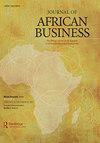Corruption-Induced Inhibitions to Business: What Business Leaders Have to Say in Ghana
IF 1.8
Q3 BUSINESS
引用次数: 4
Abstract
ABSTRACT The paper examines how corruption-induced inhibitions influence business-related corruption from the perspectives of business leaders in Ghana. Data were collected through focus group discussion with Chief Executive Officers (CEOs) of multi-national and local companies operating in Ghana. The findings show that business leaders encounter multiple regulatory agencies with duplicated and overlapping functions, multiple charges for virtually the same and duplicated services, multiple law enforcement agencies also performing regulatory functions at the Ports of entry, inadequate information on processes and costs of services, and inadequate channels for reporting corrupt activities in Ghana. The paper argues that these challenges trigger corruption-induced inhibitors which in turn, negatively affect the growth of the private-sector in Ghana.腐败对商业的抑制:加纳商界领袖的话
摘要本文从加纳商界领袖的角度考察了腐败引发的抑制对商业相关腐败的影响。数据是通过与在加纳运营的跨国和当地公司的首席执行官进行焦点小组讨论收集的。调查结果显示,商界领袖遇到了多个职能重复和重叠的监管机构,对几乎相同和重复的服务收取多项费用,多个执法机构也在入境口岸履行监管职能,有关服务流程和成本的信息不足,报告加纳腐败活动的渠道不足。该论文认为,这些挑战会引发腐败引发的抑制因素,进而对加纳私营部门的增长产生负面影响。
本文章由计算机程序翻译,如有差异,请以英文原文为准。
求助全文
约1分钟内获得全文
求助全文
来源期刊

Journal of African Business
BUSINESS-
CiteScore
4.60
自引率
10.50%
发文量
36
期刊介绍:
Journal of African Business is the official journal of the Academy of African Business and Development, the largest network of professionals committed to advancement of business development in African nations. JAB strives to comprehensively cover all business disciplines by publishing high quality analytical, conceptual, and empirical articles that demonstrate a substantial contribution to the broad domain of African business. Regardless of the research context, tradition, approach, or philosophy, manuscripts submitted to JAB must demonstrate that the topics investigated are important to the understanding of business practices and the advancement of business knowledge in or with Africa. Particularly, JAB welcomes qualitative and quantitative research papers. JAB is not, however, limited to African-based empirical studies. It searches for various contributions, including those based on countries outside Africa that address issues relevant to African business. Targeted toward academics, policymakers, consultants, and executives, JAB features the latest theoretical developments and cutting-edge research that challenge established beliefs and paradigms and offer alternative ways to cope with the endless change in the business world. Covered areas: Accounting; Agribusiness Management and Policy; Business Law; Economics and Development Policy; Entrepreneurship and Family Business; Finance; Global Business; Human Resource Management; Information and Communications Technology (ICT); Labor Relations; Marketing; Management Information Systems (MIS); Non-Profit Management; Operations and Supply Chain Management; Organizational Behavior and Theory; Organizational Development; Service Management; Small Business Management; Social Responsibility and Ethics; Strategic Management Policy; Technology and Innovation Management; Tourism and Hospitality Management; Transportation and Logistics
 求助内容:
求助内容: 应助结果提醒方式:
应助结果提醒方式:


